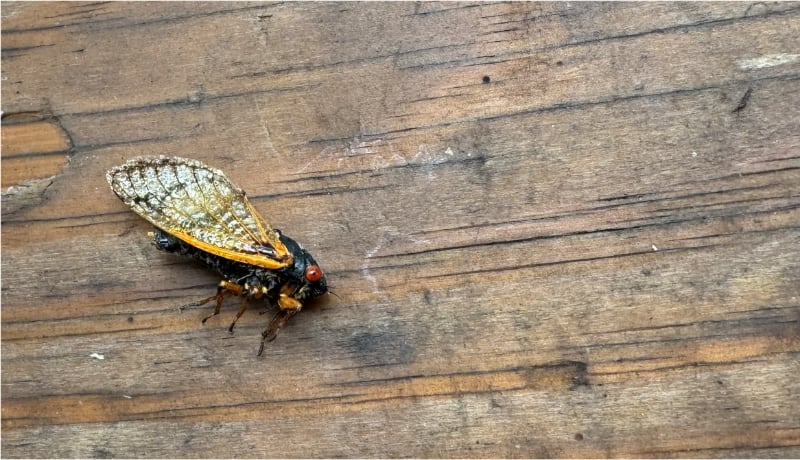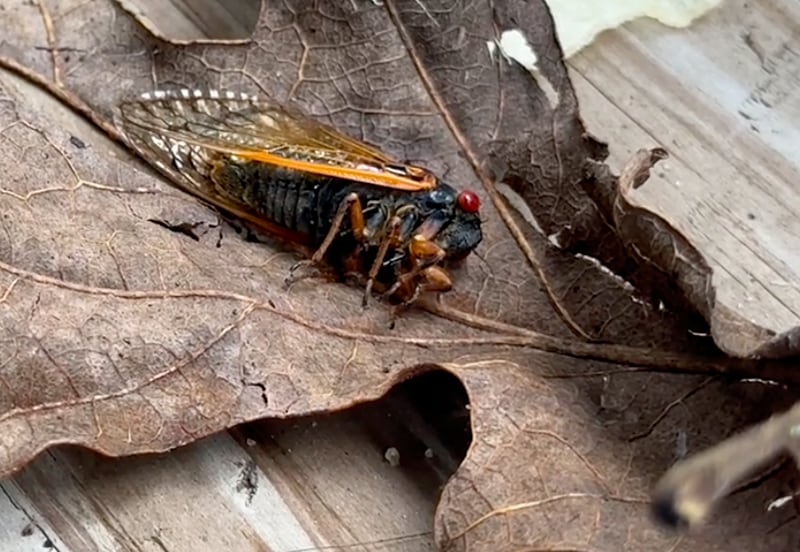A Cicada's Indelible Mark
As the multitude of cicadas sang briefly across the nation this past month, a storm blew one of them onto my path. Strange as it may sound, as I witnessed that little bug struggle through the aftermath, I was given a masterclass on dealing with my own storms.
After a spring full of metaphorical thunderstorms for both my mom and I, we took to the woods by Table Rock Lake to enjoy the peace, if not the quiet. Arriving at the height of the emergence of the periodical cicadas of Brood XIX (“the Great Southern Brood”), their symphony was almost deafening as we pulled in.
On the second day in the cabin, a massive storm hit and downpour after downpour slammed the cabins and the trees around them. Continuing into the next morning, it was a wonder any of the cicadas managed to hold on to their respective tree branches. One didn’t.
I walked out onto the porch after the storm to find a cicada stuck on his side. Grabbing a leaf, I gently prodded the little guy and at first thought he was dead. Then the bug’s tiny legs wiggled. It was clear how he had ended up on the porch: his intricate, delicate, translucent wings were matted down with water.
The day was growing hotter and plenty of animals prowled about that might find an immobilized, allegedly tastes-like-shrimp bug a tempting snack, so I put a few leaves around the drenched bug for cover. As I went in and out throughout the day, I kept thinking he had passed. Then, those tiny legs would start moving again. Maybe just a little longer to recover…

I’ve always enjoyed the summer songs of the “annual” cicadas. From the time I was a kid, summer’s arrival has felt like it was hailed by them turning on the background soundtrack. Once or twice a summer, I will run into one of those greenish-hued, gentle, slow-moving bugs and feel appreciative for its summer songs.
Appreciative for a moment, but then back to other matters. Despite living through now four of the 13-year emergences of their periodical cousins, I never noted the bright red eyes that grace a given area only every 13 or 17 years. How I failed to distinguish the latter’s incredibly loud performance from those later summer regulars, I don’t know.
We grow accustomed to many sounds of the “wildlife” each summer, amongst them frogs croaking, crickets chirping and, yes, those annual cicadas singing. There’s a comfort to these familiar sounds returning year after year. “Sameness.”
Sure, I know that the backdrop of summer is made up of hundreds or thousands of distinct, individual voices. But, going about life, I tend to hear the finished, comforting sound blanket and pay little attention to the individual sonic stitches.
Something has to happen to draw the mind’s focus from the tapestry’s completeness to the contemplation of how each “stitch” in it is a distinct little creature. The night before my introduction to a struggling, rain soaked cicada helped me to be aware enough to note my six legged friend’s plight.
I had pulled out my camera that previous day, my first full day in the woods, and spent a long time taking pictures of a few cicadas walking and bumblingly hovering about the porch. I kept trying to get any random one of the many focused in an interesting pose.
Tracking them around, individual characters emerged out of the crowd. One was timid; another a goofball, chirping around me like he was showing off his newfound flight. Each exhibited a distinct personality and their huge eyes stared at me inquisitively, taking in the vast world they’d only known from underneath for more than a decade.
How amazingly created are these little creatures we often pass by with nary a second thought! No longer was I merely seeking a random subject.
Thus, when I encountered the little one that was struggling after the storm, I found myself pulled to root for him to get back on those wiggling feet. Sporadically, barely more intentionally than the random twitches of a dead bug, my “patient” kept me hoping with the slightest evidence of purpose in his legs and wings.
Then as evening approached, a chirp. Then another, then a whole little song. This cicada, unable to right himself to an upright stance, much less fly, started joining in the chorus with the full cicada songbook, punctuated throughout with his chirps.
“Little Chirpy.”
As it grew dark, we brought Chirpy inside in an empty food container made hospitable by a bed of moist leaves and sticks — a makeshift tree. A small, immobile bug chirping would never be able to dry out and have any hope of recovery in a night full of predators.
As the little guy chirped, chirped, chirped, but still was unable to move, the idea that he wasn’t going to recover loomed with unyielding intellectual clarity, but… what if? Is that chirp stronger sounding?
Late into the night, all the way until the time I fell asleep, he performed the setlist of cicada songs, tracking with the changing tone of the ones that stirred every so often outside the screened-in back porch. At every point, his song filled the cabin with a remarkable strength incongruous to his state.
I fell asleep listening to Little Chirpy give his all to join with the rest of his kind in that mysterious, magical summer serenade. This private concert from a determined bug was something I’ll never forget.
The next morning, a terrible silence weighed in the air where that song had resounded.
I hoped he was resting. He had, after all, been still for long periods the day before. As the day wore on with no hint of wiggle or chirp, the finality of the previous evening’s song was undeniable. The little bug that had well earned the name Chirpy faced death singing his tiny bug heart out.
If you have never spent time close to a creature of the likes of Chirpy, this story might sound ridiculous. It’s a bug, Tim! Yes, yes, Chirpy was a bug. But, bug or not, Chirpy was a creature designed by God with incredible intricacy and who showed a certain grace in a desperate time I would struggle to mimic.

Jesus tells us that God knows the hairs on our heads and the falling of a single sparrow. He knows the falling of a cicada, too. From the precision with which the periodical cicadas arrive above ground every 13 or 17 years to the exquisite detail of each one’s unique wing patterns, a tiny bug we may give very little thought to is an amazing showcase of the Creator’s careful art.
Like us, even an insect has been made for a purpose. And as I thought about Chirpy, I was struck: this little bug couldn’t move; couldn’t fly the brief, but glorious, flight cicadas await to embark upon; couldn’t approach a tree to drink the sap of it — couldn’t do virtually anything. But he had control of his tymbal and he used it to sing as heartily as any cicada ever could.
The little creature’s determination felt like he was taking his short time left to teach me a lesson I tend to miss. When things — thankfully, thus far, far less severe things — happen to me, how often does it derail me from the God-given abilities I still can do?
How could this distressed bug keep going on what little bit he could do and I, blessed with reasonably good health and abilities, constantly get distracted by what goes wrong?
Millions of cicadas came and went this spring, but sharing the last hours of the life of one was anything but generic. A minuscule life I might never have known but for a rainstorm knocking him down, left a profound mark on me as he lived what I frequently fail to.
God’s wisdom can be lived and shared from unexpected parts of His creation. Sometimes the messenger is a bug. Proverbs 30:24-25 calls ants wise for their preparations. A cicada who poured his remaining strength into the only ability he still grasped was too.
How well we would all do if we could share the focus and determination of a bug who just wouldn’t quit until his final moment of life.

Timothy R. Butler is Editor-in-Chief of Open for Business. He also serves as a pastor at Little Hills Church and FaithTree Christian Fellowship.
You need to be logged in if you wish to comment on this article. Sign in or sign up here.

Start the Conversation